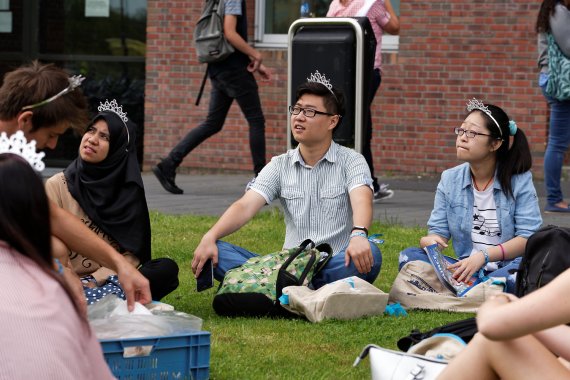International students during the Annual Introduction Days in 2015. © Sven Menschel This was indicated yesterday during a debate within the House of Representatives. Van Engelshoven had previously mentioned that English-taught education must be advantageous and not only be intended as a means to recruit international students. However, she has yet to sound as resolute as she did yesterday.
‘There are substantial incentives in the funding system to retain as many students as possible, because then your piece of the pie remains the same,’ she told the members of parliament. She wants to eliminate this mechanism, ‘which we all feel is not a healthy practice.’
Well received
This was well received by the House of Representatives. The members of parliament were also able to see the significance in her explanation of stricter monitoring of English in higher education. From now on, during the educational quality inspections that occur every six years (accreditations), English-taught degree programmes will have to justify the decision to make English the language of instruction.Only the VVD (People’s Party for Freedom and Democracy) showed some hesitation. ‘The rules shouldn’t change during the game,’ said parliament member Judith Tielen. ‘Accreditation generates a lot of work pressure already, so it should not become unmanageable.’
If you are not in a position to comfortably make a case for why your degree programme is in English, you need to seriously reconsider this choice.
However, the SP (Socialist Party), which is the opposition party, agreed with the minister. ‘I am not accustomed to defending the minister’s policies,’ said parliament member Futselaar, ‘but if you are not in a position to comfortably make a case for why your degree programme is in English, you need to seriously reconsider this choice. I say this as someone who has had to participate in accreditations.’ He was previously a lecturer in HBO (higher professional education).
Modernisation
The minister also vowed that she would expedite the modernisation of the legal article on the language of instruction in higher education. The intention is that the change to the law will enter into force on 1 March 2020.
Several parties wanted to know what she plans to do, including the CDA (Christian Democratic Appeal). ‘There are no walls built around the Netherlands and we have to keep it that way,’ said parliament member Harry van der Molen, ‘but when internationalisation is implemented too carelessly, it needs to be checked.’ In his opinion, the trend towards English in higher education has overstepped its boundaries a while ago.
The minister was able to provide him with reassurance. She promised that the Dutch language would remain central in her bill, because she wants to protect Dutch as a language of education and science. If a degree programme still wants to switch to English, then the participational structure will have to decide on it.
Language policy
Moreover, the Inspectorate of Education will be conducting research into the language policy in higher education this year. In the event of ‘potential excesses’, Van Engelshoven promised that inspectors would intervene, but she did not define what exactly qualified as an excess. In the autumn, the House of Representatives will be provided with the findings and it is expected that the parties will discuss the topic again.

